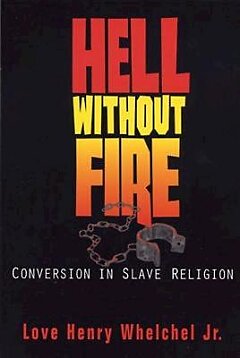Hell Without Fire
Conversion in Slave Religion
Hell Without Fire has been nominated in the Creative Nonfiction Historical Division category of the 39th Annual Georgia Author of the Year Awards. Abingdon Press would like to congratulate Henry Whelchel on this honor.
Conversion is one of the most significant motifs in American church history. From the First and Second Great Awakenings to early twentieth century Pentecostal revivals and contemporary Evangelical movements, conversion in all its extravagant forms is important to the story of religion in America.
L. Henry Whelchel takes up this motif of conversion as it relates particularly to enslaved Africans and Black Americans. He explains the role of conversion in the complex interaction between blacks and whites in America. Beginning with the differences between European and African forms of slavery and the importance of the motif of conversion to white legitimization of the Atlantic slave trade, Whelchel describes the process of slave conversion as one in which slaves were separated from African religion and culture. He counters the myth that Africans had no history and that African religion was entirely effaced in its American context. He demonstrates the contradictory relationship between Afro-American and Euro-American religion: on the one hand whites prohibited demonstrations of African religion and on the other hand they embraced and adopted these demonstrations of religion in transformed modes with their revivalist Christianity. According to Whelchel, "as African religion and culture were exposed to western Christianity," there was forged "a new Afro-American religion."
Whelchel's exposure of the contradiction between the propaganda used to defend slavery and the actual, historical circumstances of slaves in America is most compelling in his treatment of the role of education as an adjunct to conversion. He highlights the emergence of laws prohibiting the teaching of slaves and he explores the emergence of the plantation missions--sponsored by mainline southern denominations--to implement an oral method of religious training. He continues with the role of conversion in post-emancipation relations between black and white religion in America, in both the North and South. Finally, Whelchel chronicles the rise of the CME and the distinctions between the AME and CME, concluding with the seating of the first black CME bishops.
Conversion is one of the most significant motifs in American church history. From the First and Second Great Awakenings to early twentieth century Pentecostal revivals and contemporary Evangelical movements, conversion in all its extravagant forms is important to the story of religion in America.
L. Henry Whelchel takes up this motif of conversion as it relates particularly to enslaved Africans and Black Americans. He explains the role of conversion in the complex interaction between blacks and whites in America. Beginning with the differences between European and African forms of slavery and the importance of the motif of conversion to white legitimization of the Atlantic slave trade, Whelchel describes the process of slave conversion as one in which slaves were separated from African religion and culture. He counters the myth that Africans had no history and that African religion was entirely effaced in its American context. He demonstrates the contradictory relationship between Afro-American and Euro-American religion: on the one hand whites prohibited demonstrations of African religion and on the other hand they embraced and adopted these demonstrations of religion in transformed modes with their revivalist Christianity. According to Whelchel, "as African religion and culture were exposed to western Christianity," there was forged "a new Afro-American religion."
Whelchel's exposure of the contradiction between the propaganda used to defend slavery and the actual, historical circumstances of slaves in America is most compelling in his treatment of the role of education as an adjunct to conversion. He highlights the emergence of laws prohibiting the teaching of slaves and he explores the emergence of the plantation missions--sponsored by mainline southern denominations--to implement an oral method of religious training. He continues with the role of conversion in post-emancipation relations between black and white religion in America, in both the North and South. Finally, Whelchel chronicles the rise of the CME and the distinctions between the AME and CME, concluding with the seating of the first black CME bishops.








